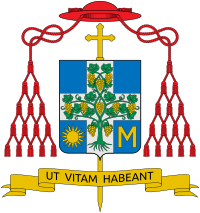Elio Sgreccia
|
His Eminence Elio Sgreccia |
|
|---|---|
| Cardinal-Deacon of Sant'Angelo in Pescheria | |
 |
|
| Appointed | 20 November 2010 |
| Predecessor | Augusto Álvaro da Silva |
| Successor | Incumbent |
| Other posts |
|
| Orders | |
| Ordination | 29 June 1952 by Vincenzo Del Signore |
| Consecration | 6 January 1993 by Pope John Paul II |
| Created Cardinal | 20 November 2010 by Benedict XVI |
| Rank | Cardinal-Deacon |
| Personal details | |
| Born |
6 June 1928 Arcevia, Italy |
| Nationality | Italian |
| Denomination | Roman Catholic |
| Previous post |
|
| Coat of arms |  |
|
Styles of Elio Sgreccia |
|
|---|---|
 |
|
| Reference style | His Eminence |
| Spoken style | Your Eminence |
| Informal style | Cardinal |
| See | none |
Elio Sgreccia (born 6 June 1928) is a bioethicist and a cardinal of the Roman Catholic Church. He is President emeritus of the Pontifical Academy for Life, director of the international medical ethics journal Medicina e Morale, president of the Ut Vitam Habeant Foundation and the Donum Vitae Association of the Diocese of Rome, and honorary president of the International Federation of Bioethics Centers and Institutes of Personalist Inspiration (FIBIP).
Elio Sgreccia was the youngest of six children born to a humble agricultural family. He was born and raised in Nidastore, a small town in the Comune of Arcevia in the Province of Ancona in the Marche region located in central-eastern Italy. His entry into the seminary was delayed by the start of World War II, so he continued to assist his family in the fields and attended a vocational school in the meantime.
He ultimately entered the seminary in Fano and was ordained a priest on the Feast of Saints Peter and Paul: 29 June 1952.
Sgreccia first served as a spiritual minister to the youth of Catholic Action. He completed university degrees in classical letters, philosophy, and theology, and worked as a professor, vice rector, and rector at Pius XI Pontifical Regional Seminary in Fano until 1972, when he became vicar general of the Diocese of Fossombrone.
On 5 November 1992, Pope John Paul II appointed him Titular Bishop of Zama Minor and Secretary of the Pontifical Council for the Family, where he served until his resignation in April 1996. He was a leading voice for the Church in its position on controversial ethical issues such as abortion, contraception, embryonic stem cell research and euthanasia. He was consecrated as a bishop on 6 January 1993 by Pope John Paul II.
...
Wikipedia
